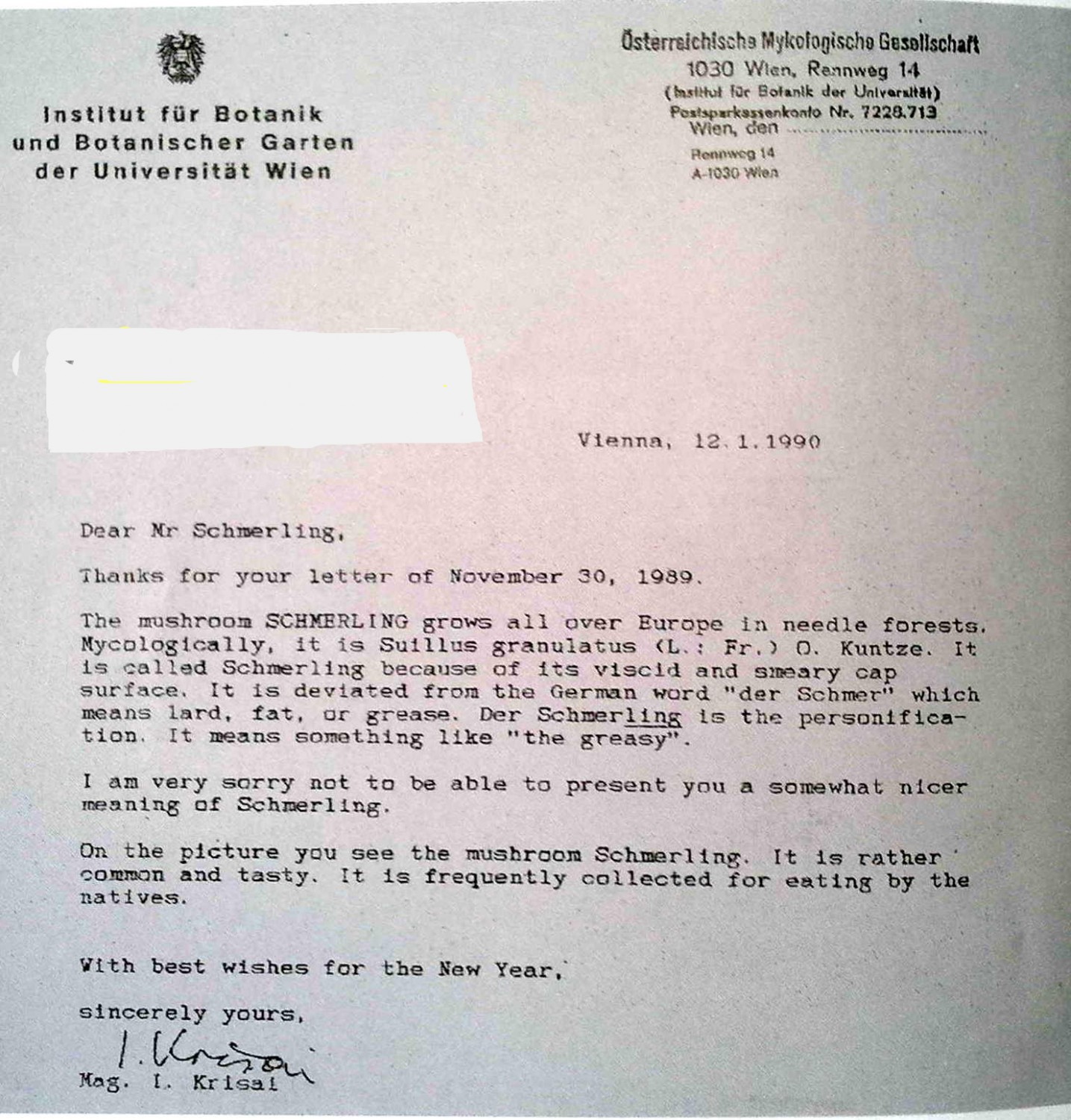
I thought that my recent post about the origin of the Schmerling name had laid the topic to rest. After going through a series of logical steps, I was certain that the source of the name, handed down matrilinealy, was “loach fish,” chosen from a list provided by the Austro-Hungarian Empire to the Jews in 1787 when they mandated the taking of Germanic surnames.
I subsequently learned that the original address of the family patriarch and matriarch, Elias Kornmehl (1846-1902) and Doba Schmerling (1850-1916), in Tarnow, Poland, was translated as “Fish Street.” That story, of how Flora Schmerling Selwyn returned to her grandparents’ family home with her Tarnow-born daughter-in-law, deserves — and will get — its own post. I mention it briefly here because it seemed to cement the loach fish theory — and to eliminate all others that had the Schmerling name being adopted in Vienna later than 1850, the date of Doba Schmerling’s birth.

But then another precinct was heard from.
Mushrooming support for another contender
Without going into too much confusing detail, the Schmerling family to whom I am related has been corresponding with a very nice man seeking a member of the Schmerling family to whom we are not related.
This nonrelated Schmerling-seeker put this document into evidence:
How sweet is the botanist’s apology for “not being able to present you a somewhat nicer meaning of Schmerling” than greasy mushroom? The reference to the mushroom being frequently consumed by “the natives”– I’m picturing forest nymphs — is charming too.
I’m not going to lie. The definition of “Der Schmer” as “the greasy,” is a bit offputting — but not surprising. “Schmer” also sounds like “schmaltz” — chicken or goose fat — and “schmear,” which means to spread, especially fat. In Yiddish, it has come to refer specifically to a small amount of cream cheese spread on a bagel (“I don’t want too much, just a schmear”). Yiddish is a language for humor — and sorrow — it seems.
Why Are These Names Different From All Other Names?
Which brings me to the other night, when I was telling a friend about my research into the Schmerling family name and how pleased I was to resolve the mystery of its origin. His first reaction was to laugh at what he perceived to be an amusing Jewish name. But when I mentioned that one of its theoretical sources was a public figure named Anton von Schmerling, he no longer found the name funny. The “von” and “Anton” apparently conferred Teutonic gravitas.
This reaction made me a little uneasy and, finally, sad.
I’m not saying it’s a slippery slope, exactly. But it made me think that it’s moot whether Schmerling was the name of a fish or a mushroom chosen from a “preferred” Austrian list. Once attached to Jewish people, the name becomes “other,” whether inspiring a chuckle — or a death sentence. After the Anschluss, the Schmerling family was forced to flee Austria. Four members ended up hidden in an attic in Holland, like Ann Frank.
But that’s another story, a completely verified one, coming soon.
Note: The picture next to the title of this piece is of Schmerlingplatz in Vienna which — unlike the Kornmehl-Schmerling family — took its name from Anton von Schmerling. It is courtesy of Wikimedia Commons, photographed by Buchhändler.


That’s pretty amazing about the greasy mushroom letter. I can’t imagine why it suddenly wasn’t funny anymore to someone when it wasn’t a Jewish name – I think it was still funny – only somehow more embarrassingly ridiculous, Von Greasy Mushroom!
Oh, sorry, I wasn’t clear. I wasn’t specific about the greasy mushroom, just mentioned that I was trying to find the source of the name, Schmerling. When my friend thought the name itself was Jewish he found it funny; when it became Germanic, he suddenly became more respectful.
I formulated the connection to the Fish Street and chosen name Schmerling. No doubt there was fond nostalgia to the family home – and shul which was near by and a desire to remain strongly attached, even during separation and exile (and as a ‘fingers up’ to the forced conversion of all names to Germanic ones). Don’t forget, even when Jewry was dangerous to practice in public, they held secret meetings and continued their love of God. (Even those who had converted for either survival or to ‘get on’ in life…they still very often clung to their spiritual aspirations and Jewishness). Miriam. PS: Huge Gratitude to Edie and others for piecing together this amazing family. xx (pps: the mushroom idea – interesting though it is – I feel is highly unlikely and rather random)
Thanks for the input, Miriam, much appreciated! It’s a fascinating question, isn’t it? I think that, whatever the disputed details, it’s pretty clear that the Schmerling name was present in Tarnow, before the brothers headed for Vienna. I looked for the famous statue, by the way, and never quite found it, though I found signs pointing in that direction.
You’re very welcome, Edie.
Can I add (re the mushroom thing) that not only the smell, but the taste and/or texture may have resembled ‘said’ fish!…this is a very common way of naming a plant – something it resembles.
Miriam.
PS: Re the mushroom name. Perhaps those particular mushrooms SMELT LIKE FISH (and if Loach fish were commonly eaten, then perhaps they smelt of loach fish!!) Miriam
I like it!
ps: forget the misleading/extraneous ‘mushroom’ reference. I feel sure it was NAMED AFTER a Schemrling…as is common in plant naming (named after the person discovering it). What comes first, the fish or the fish egg? ha ha….
and yes, the Anton von Schmerling is wholly inaccurate. ‘Our’ Schmerlings go right back to at least 1773 (when Henoch Schmerling was born). He may have been the first to adopt the name and/or his parents as he was a child when the new surname edict was declared. They, by the way, had about 20 years’ grace, to take up a name, otherwise one would be allocated by the civic authorities, and often they were plain rude! eg Gross (fat/big), Klein (small). etc